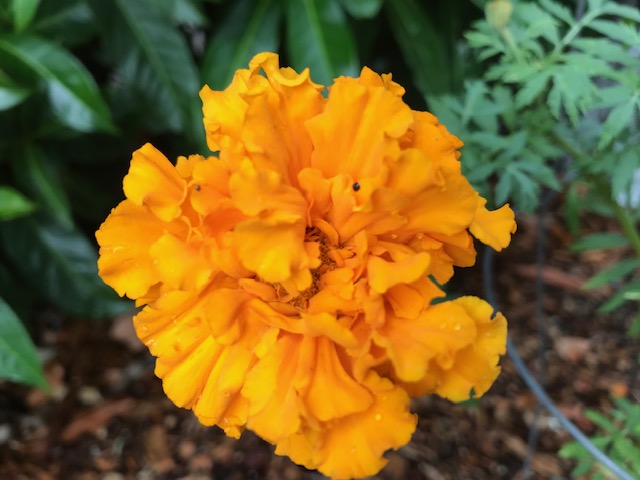I’ve been wanting to write this post for quite some time, but keep putting it off. The topic is hard enough to talk about with those I’m closest to, so I don’t necessarily want to spill it all on the internet! But at the same time, I always appreciate when others share what they’ve learned from their mental health struggles, because it helps me gain a lot of insight into my own situation. This post is my attempt to do the same.

In July of 2020, I was completely miserable. I hurt everywhere – in my body and mind – to the point where I could barely function. I felt an intense weight in my chest, a gripping pain; it took a lot of energy just to hold my body up. I’d shut myself in the bathroom and start weeping for no particular reason. Though I’ve always been an anxious person and prone to depressive thoughts, I had always been able to manage these in the past. But that month, everything felt like it was spiraling out of control. And I couldn’t imagine that it would ever end. I started fantasizing about ways I could make the pain stop (none of which, to put it mildly, were healthy options).
Despite the love and support of my family – which I am grateful and privileged to have – I just couldn’t manage to pull myself together. So, one morning, I finally worked up the courage to call my health provider and find out what my mental health options were. I was practically in tears, trying to spit out the phrase we’ve all been trained never to say: I can’t do this on my own. I need help.
It was incredibly hard. But I did it. Because I was miserable, yes, but also because I wanted to be there for my family. So I made the call. Since then, I’ve learned a few things….
1. It can take a while to find the right therapist.
When I made that call, I figured everything else would fall into place with ease. That’s where the story often ends, right? The struggling person gets help and everyone lives happily ever after. But in truth, that’s just the beginning of a whole new story.
I was surprised to find that my insurance provider covered a mobile app that allowed virtual visits with therapists, psychiatrists, and wellness coaches. This was a huge help during Covid… but, due to high demand, I had to wait a month to see a therapist. Thankfully, weekly chats with a wonderful wellness coach filled in that gap. I started doing yoga daily, meditating, slowing down, pushing back deadlines and focusing more on self-care.
Then I had my first session with my new therapist. It didn’t go well; she seemed impatient and disinterested. I came out of it feeling like even more of a loser than I had before. Who was I to be taking up this person’s valuable time, when so many others needed therapy more than I did? Who was I to claim being “depressed” when I had so many privileges and a supportive family? I felt like an annoying whiny white lady who was making a big deal out of nothing.
With some distance, I recognize now that the therapist assigned to me was probably just burned out. This, of course, had more to do with her own life and the demands of her profession than it did with me. But it still really hurt at the time. I had put a lot of trust and hope in the expectation that therapy was going to cure me. And when it just made me feel worse, I wondered if I had made a mistake. Maybe therapy wasn’t right for me after all?
I had to wait six weeks before my next session. And it didn’t go well either. I wasn’t sure what to do. Should I seek out a different therapist? I didn’t want to “reject” my current therapist by going with someone else. At the same time, I had come to dread therapy sessions and felt I was getting more help from my wellness coach than from my therapist. I decided to give her the benefit of the doubt and do one more session.

In the end, this problem solved itself. That therapist ended up leaving the platform and I was assigned to a different one. Our first session was much better – more like what I thought therapy would be. I got the sense that she cared about me and my plight, so that was refreshing. But while she had some great insights for me, we stayed solidly in the cognitive/intellectual realm. After a while, I didn’t feel like this was getting me where I needed to go.
When she told me this spring that she was leaving the platform, I decided to search for someone who would take a more experiential, creative, and body-centered approach to therapy. I also wanted someone well versed in Internal Family Systems therapy (a huge topic that deserves its own blog post!). Through the Psychology Today directory, I was able to find my current therapist, and she is AWESOME. What a difference it makes to work with someone who not only “gets” you, but is willing to engage with you in the way you find most helpful!
Real talk, though: I have to pay out of pocket to see her. It was really hard to bite the bullet and make that budgetary commitment, but fortunately we’re able to afford it at the moment (thank you, stimulus programs). And it’s important to my family that I take care of my mental health, so it feels like a worthwhile investment.
Not everyone can go this route, unfortunately. I hate that it can be such a tough battle to find the right therapist, that it’s often so fraught with personal and institutional hurdles. I wish it was easier for people who are less resourced to find help that actually works for them. That’s a rant for another time, I suppose… but the bottom line here is that you may need to “try on” a few therapists before you find the right fit.
2. You can’t talk (or think) your way out of depression.
Finding the right therapist is only part of the battle, because talk therapy alone doesn’t cure depression. Yes, talking with a therapist is incredibly valuable in helping us process our hardships and unhealthy patterns. Yes, learning how to reframe our thoughts and focus on positive self-talk are essential coping skills. But these things aren’t enough, because trauma and anxiety and depression don’t just live in the mind. They live in the body, too, and in the soul.
To be effective, talk therapy needs to be paired with action (like, actually taking steps to change those unhealthy patterns), and movement (like yoga, outdoor walks, etc.), and creative and/or spiritual pursuits. This can be SO hard when you barely have motivation to get out of bed, let alone fill your life with these types of nourishment. You don’t have to do everything at once, of course. But it’s important to acknowledge that our minds are but one small part of us. True healing comes from integrating mind, body, and spirit.

3. Medication can be a lifesaver.
My own mental health care regimen includes antidepressants. It’s still a bit hard for me to say that “out loud,” but there it is. If you’ve read my books, you know I’m not a huge fan of the pharmaceutical industry. In my view, depression is often caused by modern society and the many ways it isolates and disembodies us. But even though I was doing all the “right” things, therapy and yoga and meditation and reaching out to friends, I was still struggling. I wanted so badly for all of that to be enough! Why should I have to add chemical intervention to the mix?
Then the following truth dawned on me: Depression is a life-threatening disease. We all know of someone whose battle with depression ended in tragedy. To me, it feels like a form of autoimmune disease, where the mind turns on itself. Thoughts become weapons, attacking the person’s sense of self-worth, twisting reality, constricting the body, making life relentlessly miserable. This can have disastrous results. So why not acknowledge this disease with the gravity it deserves? You wouldn’t treat cancer with yoga alone; perhaps there is a role for pharmaceuticals to play.
Once I resigned myself to taking them, antidepressants haven’t been so bad. And both my psychiatrist and current therapist brought up an important benefit I hadn’t considered before: they often allow you to go deeper in therapy. They take the edge off, allowing you to deal with painful topics you might otherwise avoid (sort of like novocaine for dental work). The hope is that if you’re able to get to the root of your issues and process them in a safe environment, you’ll eventually get to a place where you no longer need the meds.

4. Healing is a lifelong journey.
This was another tough one for me to swallow. We often tend to think of recovery as a binary: either you’re broken, or you’re healed. In actuality it’s a long continuum, and we slide back and forth along it all the time. Recently, I was feeling so good after finding my new therapist, reconnecting with family and friends, packing the summer full of social engagements… but then I crashed back down into the dumps. I met this at first with resistance – No! This can’t be happening again! – and then with surrender.
I’ve learned a lot of coping skills this past year, and know better what I need to do when these relapses arise. After all, things can’t be sunshine and roses all the time. It’s part of the rhythm of life. Winter follows summer; night follows day. And now I have lived experience showing that depressive episodes will continue to come… but I’ve proved that I can get through them, too.
Resources
I’ve compiled a long list of mental health resources on this page. If you’re feeling overwhelmed and don’t know where to turn, please get in contact with a crisis line (there are even text-based options if voice calls feel too intimidating). Regardless of what your brain may be telling you, you deserve to get the help you need! ❤️



Thank you so much for this brave and important post Alanna. We love you (and we love reading your books too!)
Thank YOU, Brett. I appreciate your support so much!!! ❤️❤️❤️
Thank yhou for sharing and letting us be part of this journey!
My pleasure (sort of! I mean, it’s hard to put it out there, but if it can help someone else who is feeling alone in their struggle, it’s definitely worth it) 🙂
Thanks for sharing, Alanna! I appreciate the insight.
Thank you for your comment, Nathalie! Glad you found it insightful ❤️
Pingback: Talking to My Self - Alanna Peterson